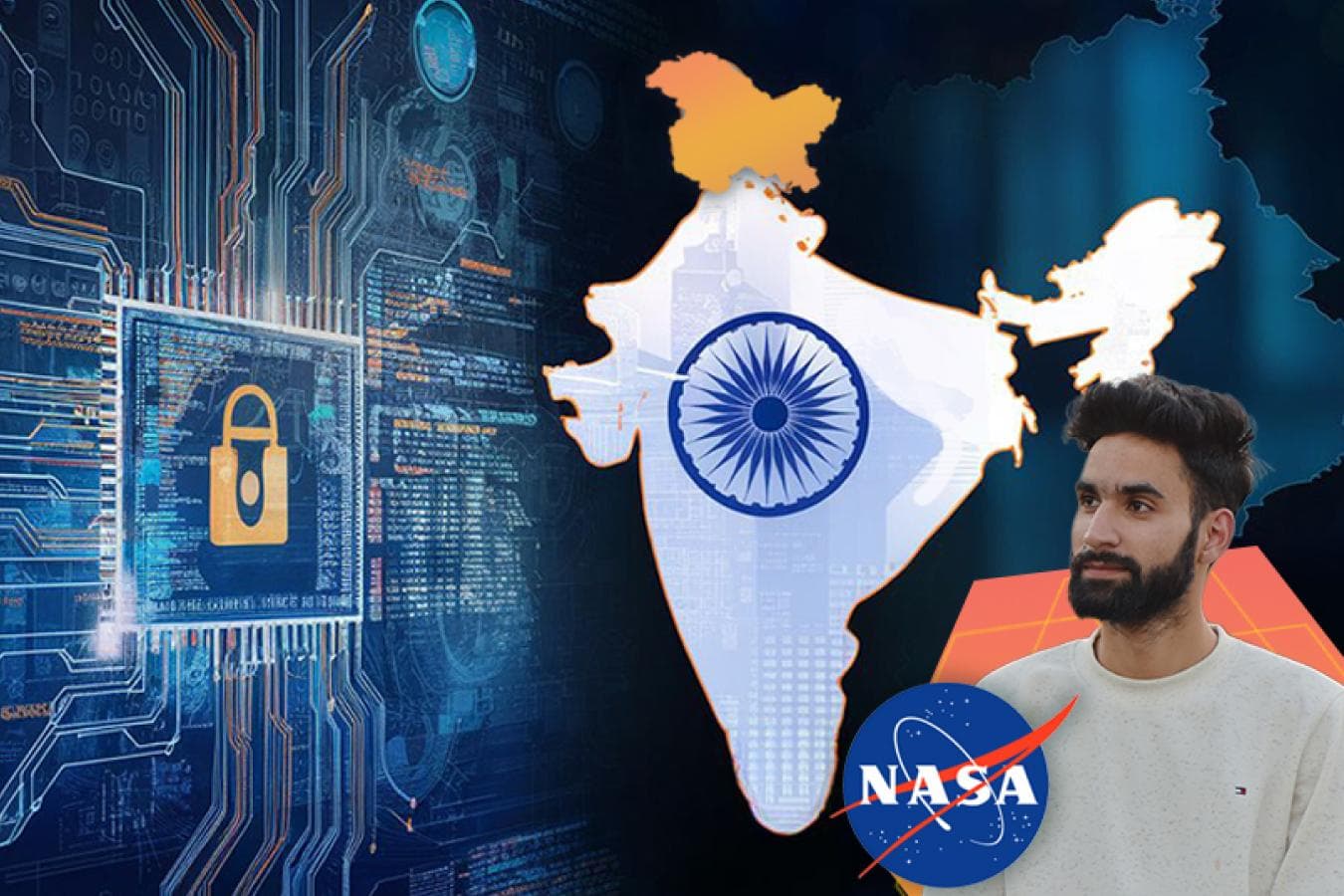From a Remote Village in Kashmir to NASA’s Hall of Fame
Journey of a 22-year-old Ethical Hacker reflects the aspirations of Kashmir Valley's Youth to emerge as a Tech Hub.
Muneeb Amin Bhat

ذرا سا خواب دیکھا، حقیقت میں ڈھال دیا
خود کو محنت سے، ایک مثال بنا دیا
“Zara Sa Khwab Dekha, Haqeeqat Mein Daal Diya
Khud Ko Mehnat Se, Aik Misaal Bana Diya”
The journey from the remote village of Zungalpora in Kashmir, where even 2G connectivity was a rare luxury, to earning a place in NASA’s Hall of Fame has been a heartfelt struggle filled with determination and countless obstacles. My fascination with the computer and cyber world began in 2012 when I was in 5th grade. The landscape was vastly different as the internet was limited to 2G connectivity in my village. With phones operating on Java OS, a PC suite tethered to a computer via data cables was the only source to surf the internet. While broadband services like BSNL were accessible in Srinagar, Airtel and Jio had yet to debut. Despite these challenges, I taught myself everything I know about ethical hacking today without any formal education. In addition to slow internet speed, concurrent shutdowns due to the security situation in Kashmir often led to internet outages, making things more difficult. Anyone with an internet-based job, including freelancers, YouTubers, journalists, and influencers, faced significant challenges during those times.
The advent of Jio in the market, revolutionised connectivity with unlimited data on 4G and 5G networks. In recent years, significant strides have been made by Jio, BSNL, and Airtel in expanding broadband services, bringing these conveniences within reach. This has helped people like me to focus more on our work with ease. I was able to enhance my skill set and reach more companies to offer my expertise .
My work gained recognition when I began identifying vulnerabilities in prominent companies. For instance, I discovered a data breach in Apple's user database involving 50,000 users. Further investigation revealed that nearly every user's data on iCloud was leaked. I reported this issue to Apple through their disclosure program, and the Apple security team validated my findings, acknowledged me in their Hall of Fame, and rewarded my efforts.
Similarly, in 2023, I discovered vulnerabilities within NASA, which led to the exposure of internal confidential data. Reporting through Bugcrowd, a platform for ethical hackers, resulted in validation from NASA’s security team and acknowledgement in their Hall of Fame. Today, I am doing this for over 60 international organisations including Oracle, Apple, Intel, McDonald’s, and NASA.
It is fascinating that many people now approach me for guidance and suggest starting a course on ethical hacking and cybersecurity. It feels like a dream come true, and no doubt the improved security and political situation in recent years has brought this positive change in the valley. There are no more internet shutdowns; the internet runs smoothly, whether mobile or broadband, significantly benefiting everyone who relies on these services. This newfound stability and connectivity have created a more conducive environment for education and personal growth, allowing the young generation to pursue their dreams.
Kashmir Rising as a Tech Hub
Renowned for its natural beauty, Kashmir harbours a wealth of young, tech-driven talent that has long remained hidden due to its tumultuous past. However, this talent is now emerging and gaining international recognition. The Jammu and Kashmir Administration recognises this immense potential, especially in the Electronics and Information Technology sector and has made significant efforts to nurture the talent, making Kashmir a Tech Hub destination.
In light of this, the Government introduced the IT/ITeS Policy in 2020, promoting the region as a pioneer in Information and Communication Technology (ICT). The Union Territory (UT) aspires to become a leading investment destination for the ICT industry in the coming years, positioning itself as a major player in India's IT economy.
In 2023, Lieutenant Governor Manoj Sinha attended a meeting organised by the Kashmir Chamber of Commerce & Industry (INC), focusing on establishing a Center of Excellence for cybersecurity and introducing academic courses in Artificial Intelligence, coding, big data, and other relevant subjects.
Lt. Governor Sinha emphasised the importance of meticulously planned IT Towers set to emerge in Jammu and Kashmir. He expressed optimism that these developments would create more job opportunities, spur technological growth, and raise awareness about IT careers and startup opportunities. Sinha stated that these efforts would position Jammu and Kashmir as a hub for Information and Communication Technology.
He noted that the rapid evolution of the IT sector presents an exciting opportunity to transform J&K UT into North India's IT hub. He added that "Comprehensive cooperation, creativity, and enterprise from all stakeholders, combined with our rich pool of human resources, can energise our efforts and bring us closer to this goal."
Additionally, The Jammu and Kashmir Entrepreneurship Development Institute (JKEDI) and T-Hub, Hyderabad have joined hands to propel the startup ecosystem in the Union Territory of J&K. This collaboration aims to foster meaningful connections between startups, investors, and incubators. I believe these initiatives mark a significant step in the region’s journey towards becoming a hub for innovation and entrepreneurship.
Kashmir and Cybersecurity
The valley of Kashmir is prone to cyber-attacks, with many residents, especially the elderly and illiterate, experiencing issues of unauthorised withdrawals from their bank accounts.
Scammers often bait victims by sending malicious links, and many people accidentally click on these links, resulting in compromised personal information. Recently, the Jammu and Kashmir Police Cyber Cell in Kupwara successfully solved an online financial fraud case, recovering Rs 96,606. The victim had received a fraudulent call for credit card activation, which led to the unauthorised debit of the amount after following the instructions provided during the call.
Last year, the cyber police registered a case involving a multi-crore fraud perpetrated by Curative Survey Private Limited. This company deceived hundreds of people across Jammu and Kashmir by promising sustained monthly income in exchange for a registration fee and participation in online surveys. Such incidents reflect the need for widespread awareness of cybersecurity.
Committed to contributing to the progress of Kashmir, government intervention holds prime significance in bolstering cybersecurity awareness. Integrating cybersecurity education into school and college curricula, along with targeted awareness programmes, to educate people about various government initiatives such as the Indian Computer Emergency Response Team, Cyber Surakshit Bharat, the National Critical Information Infrastructure Protection Center, the Personal Data Protection Bill, the Cyber Swachhta Kendra (Botnet Cleaning and Malware Analysis Center), and the National Cyber Security Policy of 2013 is essential. This would equip individuals with the knowledge to safeguard against data breaches, fraud, and cyber threats, fostering a more secure digital environment.
The cybersecurity landscape in India is witnessing an extraordinary surge, marked by a valuation of nearly 140 billion rupees and an anticipated doubling by 2025. This exponential growth is propelled by intensified investments in protection and encryption, particularly as government initiatives prioritise digital transformation. Within this dynamic sector, ethical hacking stands out as a beacon of opportunity, commanding lucrative salaries ranging from 4 lakh to 18 lakh per annum.
The burgeoning demand for ethical hackers underscores the critical need for individuals adept at fortifying digital infrastructure and safeguarding sensitive information. This demand is further accentuated by a glaring statistic: a staggering 80% of cybersecurity job vacancies globally remain unfilled, with India echoing this trend.
As organisations ramp up their online presence, the imperative for robust cybersecurity measures intensifies. Safeguarding user data, ensuring data integrity, and fortifying company assets have become non-negotiable priorities. In this context, cybersecurity emerges not just as a niche industry but as an indispensable cornerstone of the digital realm.
Looking ahead, the trajectory of cybersecurity promises significant expansion, particularly within India's evolving digital landscape. This growth heralds unparalleled opportunities for job seekers nationwide. While academic qualifications undoubtedly hold value, I believe the real currency lies in practical skills and hands-on experience. Those equipped with the ability to navigate the complexities of cybersecurity will find themselves at the forefront of a field ripe with prospects for career advancement and professional fulfilment.
prospects for career advancement and professional fulfilment.
